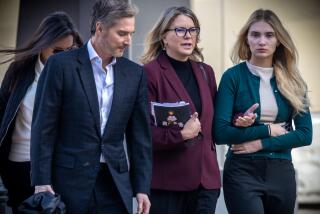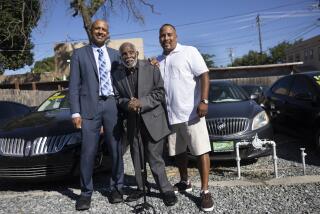Conviction for Murder Reversed
- Share via
For 16 years, Gloria Killian has been serving state prison time for being the mastermind behind a 1981 robbery and murder in Sacramento.
Killian had denied any wrongdoing, but testimony from an alleged accomplice sealed her conviction. Although she had been a law school student without any criminal record, she could find no way to prove her innocence. Until Wednesday.
As an inmate, she had become a law clerk at the California Institute for Women in Frontera. She helped other women--particularly those who had been battered--prepare appeals of their convictions.
Now her own appeal has gone her way. The U.S. 9th Circuit Court of Appeals in San Francisco on Wednesday reversed her conviction, saying it was based on false testimony by a convict who was hoping for a lighter sentence in return for helping prosecutors.
Killian’s bid for freedom was helped by Joyce Ride of Pasadena, the mother of America’s first woman astronaut, Sally Ride. After Killian met Joyce Ride at the prison, Ride became convinced Killian was not guilty.
The elder Ride, who has been an activist on behalf of women inmates for years, personally financed an investigation of the murder and hired an appellate lawyer for Killian. “I am deliriously happy; I am having trouble coming off the ceiling,” Ride said after hearing about the 3-0 decision by the 9th Circuit.
Ride said she has visited Killian every other weekend for the last eight years and considers her a good friend.
The appeals court ruled that Killian must be freed or given a new trial.
Trying Killian again would be difficult, given that the sole witness against her is Gary Masse, who was described by 9th Circuit Judge Michael D. Hawkins, a former prosecutor, as a “thoroughly discredited” perjurer in Wednesday’s decision.
The appeals court said that Masse had lied to the jury both in describing Killian as the “mastermind” of a robbery plot that led to murder and about the fact that he had made a deal for leniency in return for his testimony.
Nathan Barankin, a spokesman for Atty. Gen. Bill Lockyer, said Wednesday that attorneys in that office are reviewing the decision to determine their next move. “It is a difficult case,” Barankin acknowledged.
Masse’s testimony in a separate trial stemming from the same murder played a key role in sending another man, Stephen DeSantis, to death row in San Quentin. Appellate lawyers for DeSantis were challenging that sentence until last week when he died of natural causes, according to Warden Jeanne Woodford.
If Killian, now 56, secures her freedom, she wants to finish law school and continue to help other inmates, according to her appellate lawyer, William J. Genego of Santa Monica.
Killian’s troubles started in December 1981 after DeSantis and Masse broke into the home of a Sacramento couple, Ed and Grace Davies, hogtied them and robbed them of six suitcases full of silver. During the crime, Ed Davies was shot and killed; his wife was also shot, but survived.
A few days after the murder, an anonymous phone call to Sacramento authorities identified DeSantis and Masse, who are cousins, as the perpetrators. When police went looking for Masse, his wife told them “a woman named Gloria” had planned the robbery. A few days later, Masse surrendered to the police and Killian was arrested. But after a preliminary hearing, charges against her were dismissed.
Masse was convicted of first degree felony murder in May 1983 and sentenced to life without possibility of parole. Soon after being sentenced, he contacted the Sacramento sheriff’s office “to see if any deals could be struck,” according to the 9th Circuit decision.
After being told that prosecutors would help him obtain a sentence reduction, Masse implicated his cousin, DeSantis, and Killian, who was a casual acquaintance. After he agreed to help the prosecutors, Masse’s sentence was recalled at the request of the prosecution and he remained in custody without a sentence for three years.
Killian was rearrested in June 1983 and charged, along with DeSantis. DeSantis was tried first and testified that Killian was not involved in the planning or commission of the crime and that he had never met her or heard of her.
DeSantis also testified that Masse had told him about a prior aborted attempt to rob the Davies family in which Masse’s wife tried to get into the home by telling the Davies she needed to make a phone call.
Masse was the key witness against Killian at her 1986 trial. In addition to testifying that she dreamed up the plot, Masse said that Killian accompanied him to the Davies home during the earlier robbery attempt. He also testified that after the robbery, she called to demand a share of the proceeds. Masse also swore that he had no leniency deal with the prosecution.
Killian was convicted of first degree felony murder, robbery and conspiracy and received a sentence of 32 years to life.
The 9th Circuit decision emphasized that Masse was the “make or break witness” against her.
After Killian exhausted her state court appeals, Genego raised perjury allegations at a hearing before federal Magistrate Judge Gregory Hollows in Sacramento in 2000.
At that hearing, Masse admitted that he had told several lies in the crucial elements of his testimony. Among them were that in reality he had a leniency deal, that Killian was not the “master planner” of the robbery and that she had not called demanding a share of the robbery proceeds.
“Masse’s disregard for the truth is best revealed by a letter he wrote to the prosecutor shortly after Killian’s trial [while awaiting his own resentencing] in which he emphasized that he ‘lied [his] ass off on the stand’ for the government,” Hawkins noted in his opinion Wednesday.
That letter was never disclosed to Killian; nor was one that prosecutors sent under seal to a Sacramento trial judge stating its intention to support Masse’s resentencing as a result of his cooperation. Masse subsequently had his sentence reduced to life with possibility of parole.
The letters were discovered years later in DeSantis’ challenge to his death sentence and were given to Genego by DeSantis’ attorneys.
Masse also admitted at the hearing before Hollows that if he had told the truth at Killian’s trial, “it would have taken Killian out of participating in the crime,” the 9th Circuit decision noted.
Despite Masse’s admissions, Hollows recommended to U.S. District Judge Garland E. Burrell that the conviction be upheld; Burrell accepted the recommendation.
Burrell ruled that the level of prejudice Killian suffered as a result of each perjurious statement was insufficient to conclude that reasonable jurors would have doubts about the verdict they rendered.
But the appeals court said that Burrell had interpreted the relevant cases too narrowly.
“Because Masse perjured himself several times and because he was the ‘make or break witness’ for the state, there is a reasonable probability that, without all the perjury, the result of the [trial] would have been different,” Judge Hawkins wrote. His decision was joined by Judges Procter Hug Jr. and Dorothy W. Nelson.
The appellate judges also emphasized that the prosecutors “took advantage of Masse’s perjury, regarding his deal, arguing at closing that ‘we have nothing to do with how much time Gary Masse serves.’”
Christopher T. Cleland, the Sacramento deputy district attorney who prosecuted the case, said he had not yet read the decision, but characterized it as “a gross miscarriage.”
Cleland said he still believes that Masse told the truth at trial. “The 9th Circuit isn’t going to tell me [otherwise],” he said.
Asked about the letter in which Masse admitted lying, Cleland said it was simply “an attempt to get our attention” while Masse was awaiting resentencing. “It is much ado about nothing.”
But veteran defense lawyer Genego described the case “as one of the most egregious and serious violations of a person’s right to a fair trial that I have ever seen.”
Genego said, “There is no question that the prosecutors had an ethical obligation to bring that letter to the attention of the court and Killian or her lawyer.”
More to Read
Sign up for Essential California
The most important California stories and recommendations in your inbox every morning.
You may occasionally receive promotional content from the Los Angeles Times.












